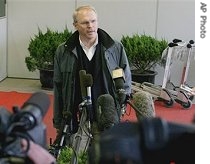2006年VOA标准英语-US Seeks Swift Progress at Korea Nuclear Talks(在线收听)
By David Gollust
State Department
13 December 2006
The lead U.S. delegate to the six-party talks on North Korea's nuclear program says he wants to see concrete progress before the end of the year. The Chinese-sponsored negotiations reconvene in Beijing Monday after an interruption of more than a year. VOA's David Gollust reports from the State Department.
The six-party talks produced an agreement in principle in September of last year under which North Korea said it would give up its nuclear program in return for aid and security guarantees.
Now, chief U.S. delegate Christopher Hill says the next phase will be implementation of that framework and he is hoping to see some tangible results by the time the new round breaks in about a week for the Christmas holiday period.
 |
| Top American nuclear negotiator Christopher Hill speaks to the media after arriving at Beijing airport Monday 27 Nov. 2006 |
The six-party talks broke down only two months after the September 2005 accord, with North Korea refusing to return because of U.S. penalties leveled against a Macao bank, Banco Delta Asia, which the United States alleges was as a hub for illicit North Korean financial activity, including passing counterfeit U.S. currency.
The United States has said it is willing to deal with that issue in the six-party framework. Hill disclosed that in tandem with the opening of the nuclear talks, U.S. Treasury Department officials will meet with a North Korea team for a preliminary discussion of the Banco Delta Asia issue.
North Korea announced it would return to the six-party talks in late October, three weeks after it tested a nuclear device and was hit with U.N. Security Council sanctions.
Hill, under questioning, said no one accepts North Korea as a nuclear power because of the test and that Pyongyang should not expect that the detonation will bring it any more bargaining power at the six-way talks.
"I don't think they should be looking for anything additional as a result of this behavior, which after all is a behavior that has frankly speaking been a step back for the talks and has done some damage to the talks," he added. "Again, I want to emphasize that what we are doing is implementing the September statement. So to suggest that they should get something else would be to suggest that we're going to change the September statement, and we're not going to do that."
Hill, the assistant secretary of state for East Asian affairs, said he would consult in Japan and possibly also South Korea before heading to Beijing Sunday.
He said all six parties would convene informally Sunday evening before the official opening of the new round on Monday.
The six-party talks, which have been underway - on and off - since 2003, include Russia, Japan and South Korea as well as North Korea, the United States and host China.